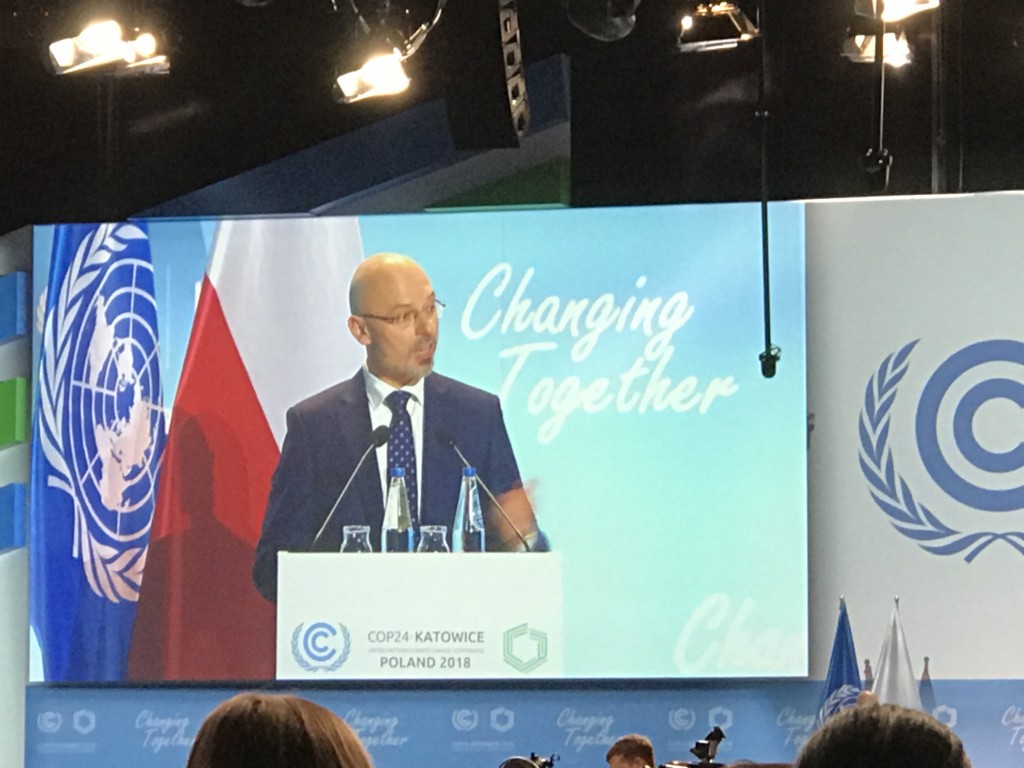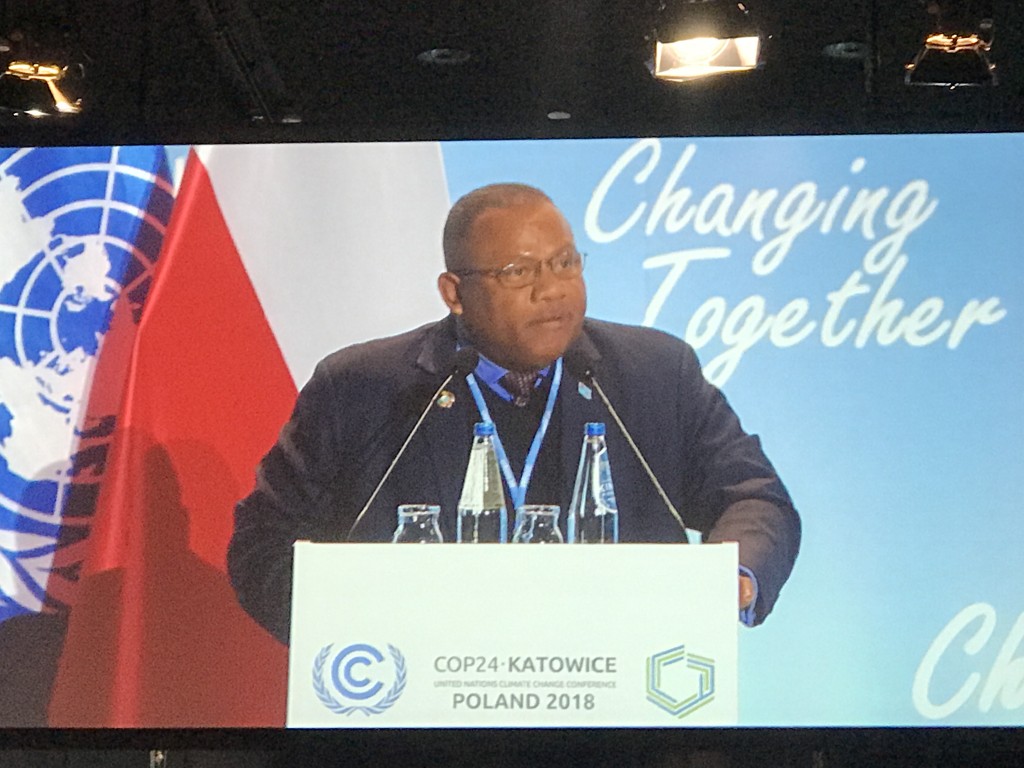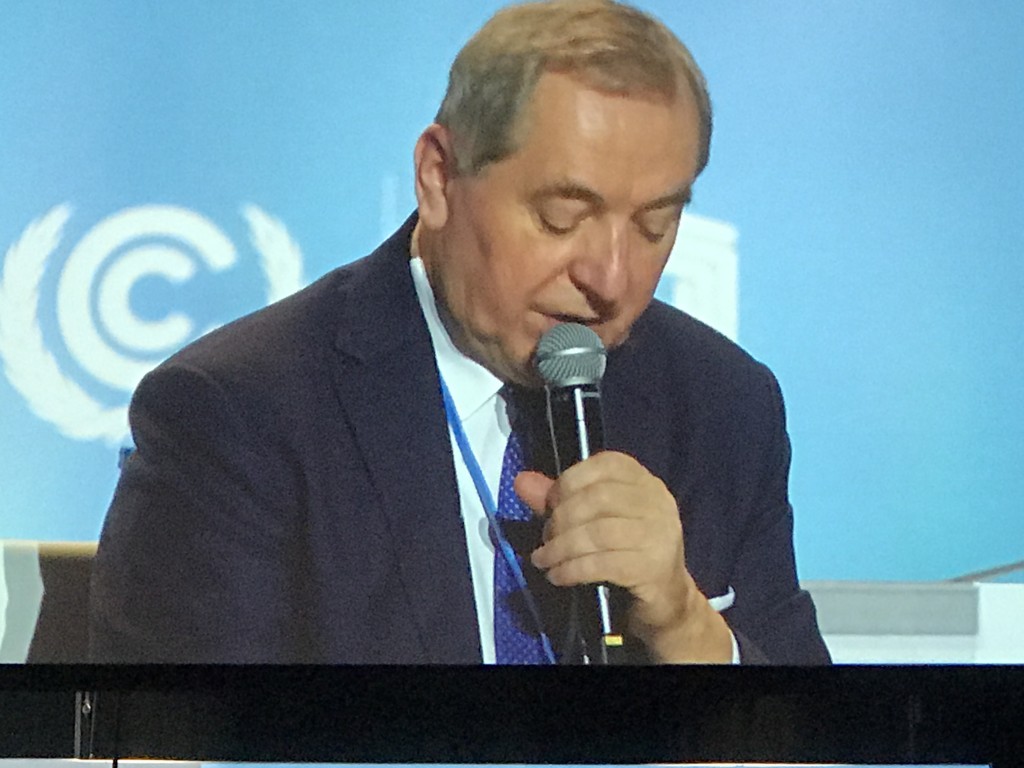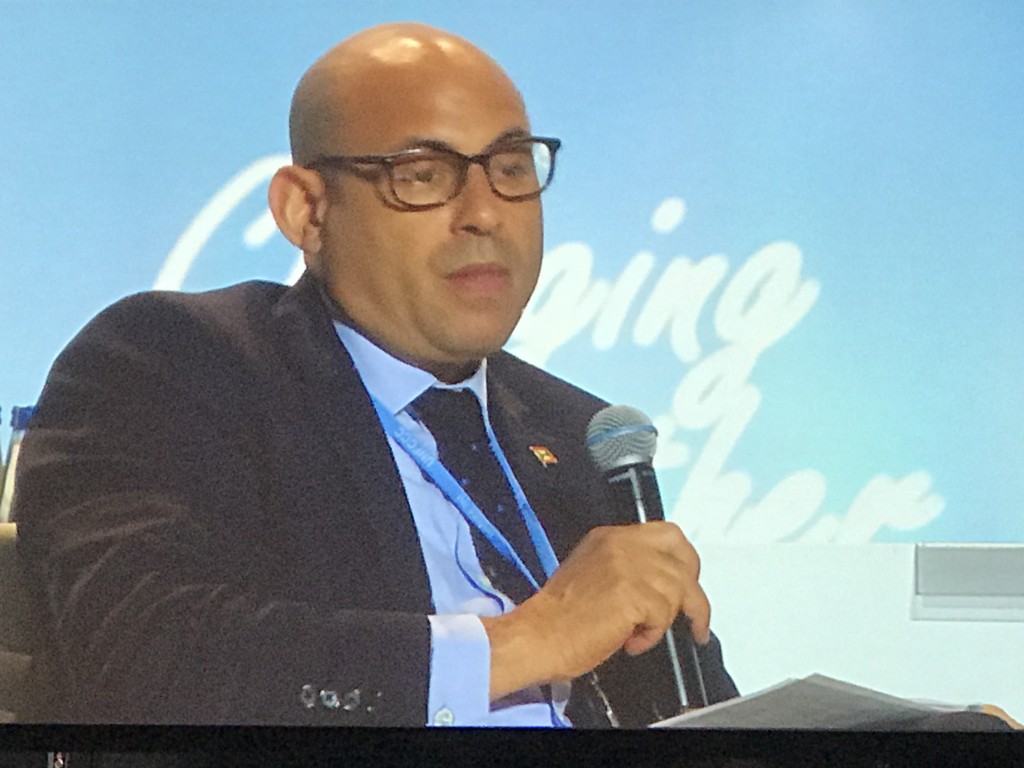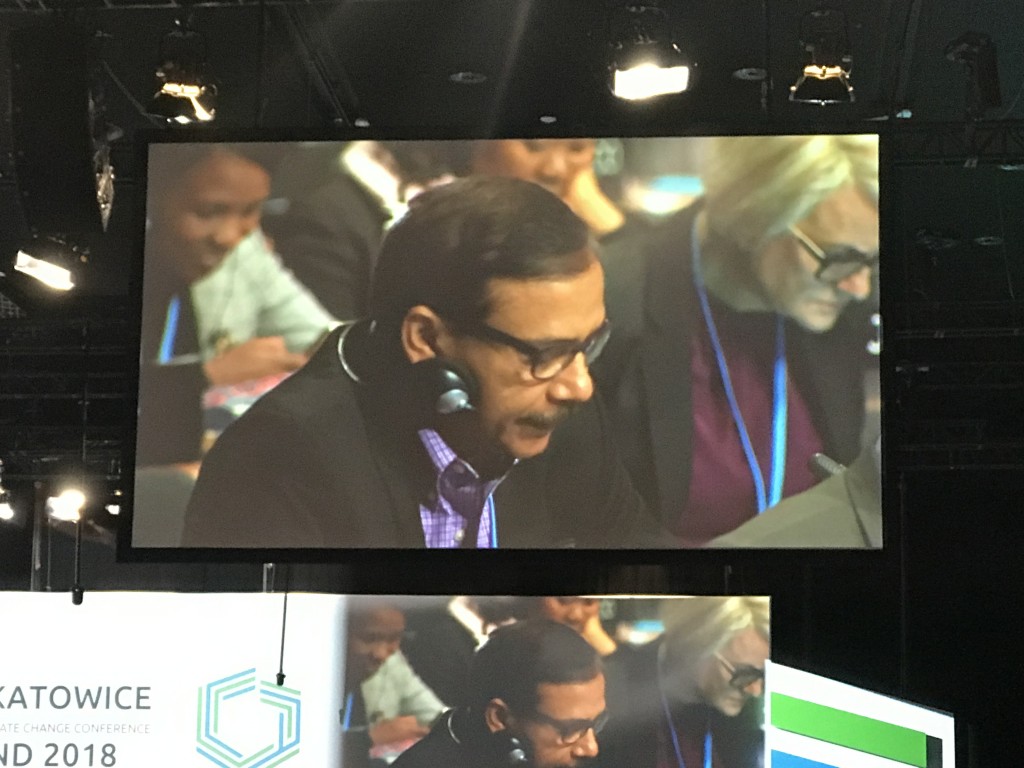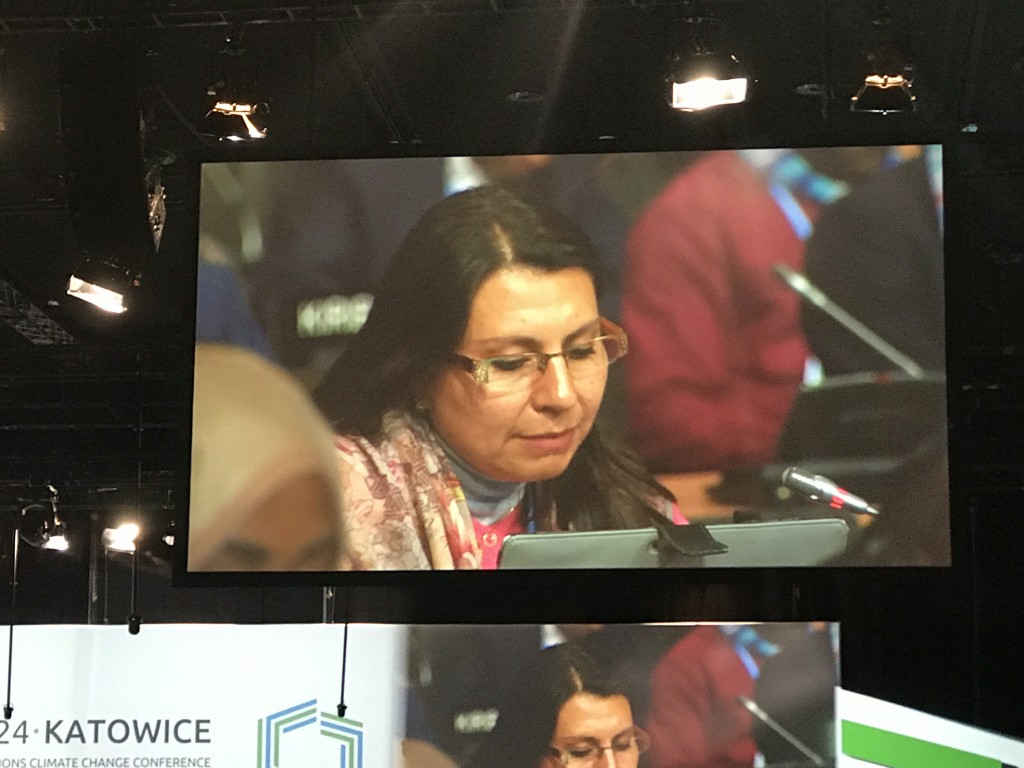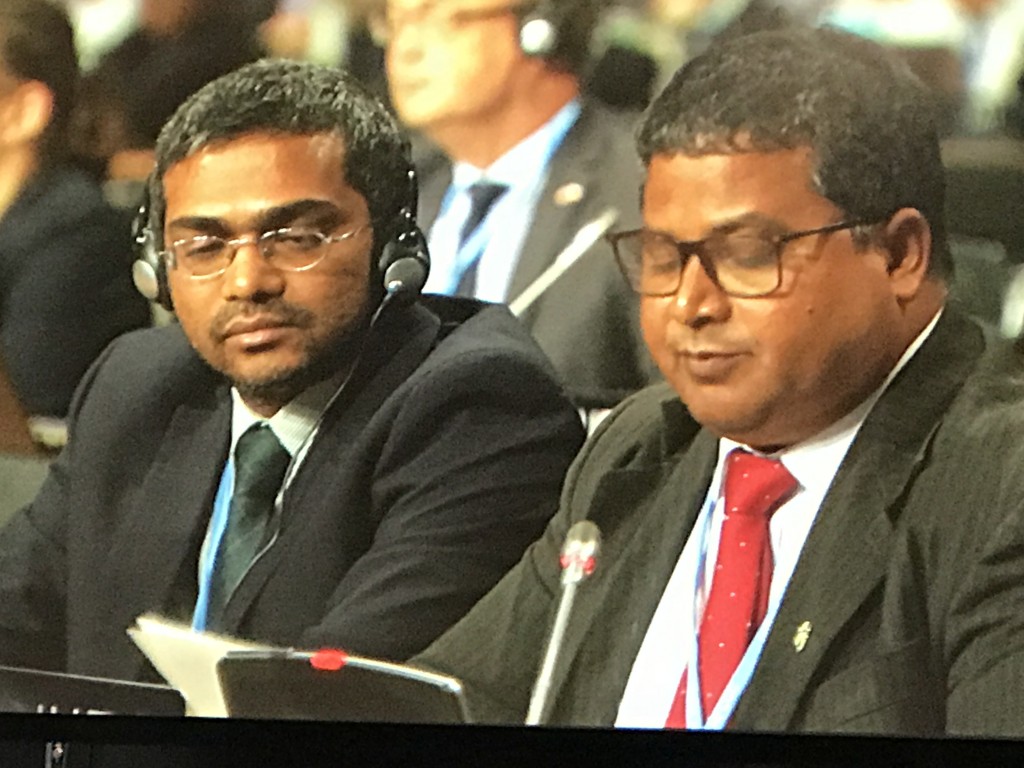After the RINGO meeting, I went to the High-Level Session devoted to assessing mitigation efforts prior to 2020. There’s been a tendency on the part of some developed countries to plan for climate action after 2020 without undertaking any present action. The pre-2020 Global Stocktake is one way to try to increase ambition and urge countries to act more ambitiously and more immediately.
The session was launched by the COP President Michal Kurtyka, State Secretary in the Ministry of Energy in Poland.
His speech, laying out the procedures used in the global stocktake, was followed by another procedural speech and then the “High-Level Climate Champion” Mr. Inia B. Seriuratu, Ministry of Agriculture for Fiji, launched a far more energetic call to action.
As is the way of conferences, however, that speech was followed by a relatively tame panel discussion. Rachel Fyke moderated a panel of speakers from Grenada, China, Poland, Australia, and the EU. Melissa Price of Australia was the only woman panelist.
Predictably, but perhaps also as part of the positive focus of the Talanoa Dialogue, each speaker focused on what their Party had accomplished in the last two years.
Poland (above) is rolling out programs right now, one focusing on energy efficiency in single family homes (projected to cut 18 million tons of greenhouse gasses). Their other major program focuses on electro-mobility: turning public transport electric (from a current diesel fleet of busses). They are supporting 44 cities in adaptation strategies—the most anywhere! (His exclamation point rather than mine.)
Simon Steel of Granada was both blunt and eloquent: he complained that developed countries were supposed to lead the way on climate action, but they had not demonstrated much leadership. The Doha Amendment (an extension of the Kyoto Protocol) has not yet entered into force because only 122 countries have ratified the amendment, and 144 (another 22) must ratify to reach the 75% threshold for it to enter into force.
Grenada’s climate action has involved “liberalizing the energy sector” by breaking the 88 year monopoly of the primary energy provider. “This has put us into the international courts of arbitration, but you see our ambition.” (I wonder what other views of this “liberalization” might be.) Grenada has ambitious plans for geothermal, which is a resource for much of the Caribbean. They are also planning to increase energy efficiency and solar.
“As for the stocktake, performance has been mixed—and that’s being polite,” Steele said. “Developed countries pledged to emission reductions 25-40% below 1990 levels. They have achieved 11%. There is more work to be done. We haven’t made the progress we need to make. The Small Island Developing States are already suffering. A Category 5 Hurricane in 2017 left one island uninhabitable in Caribbean; another island had 200% of its GDP wiped out by the passing of hurricane. This is our new normal—contiue to face ravaes of climate change
Reports of the WMO, IPCCC (and others) paint a bleak and stark picture of the almost apocalyptic world that the most effective of us will face. We have a 12 year window to react: action is both financially and technically feasible—so there is hope.
International cooperation is a critical enabler for developing countries…. This is not about fingerpointing but how we can move forward as one global community in which some of us have more capacity, some require support in capacity building.
I seem to have missed taking a picture of the EU commissioner for climate action and energy. He responded pretty directly to Grenada’s points, stressing that all of EU countries had ratified the Doha amendment, that the EU remained committed to pre-2020 action as demonstrated by them having exceeded their reduction pledge (a modest pledge of 20% reduction from 1990 levels, currently 22% reduction), that the EU remained committed to the global target of 100 billion per year to the Green Climate Fund (GCF) and that they are currently the largest donor to both the GCF and the Global Environmental Facility (GEF).
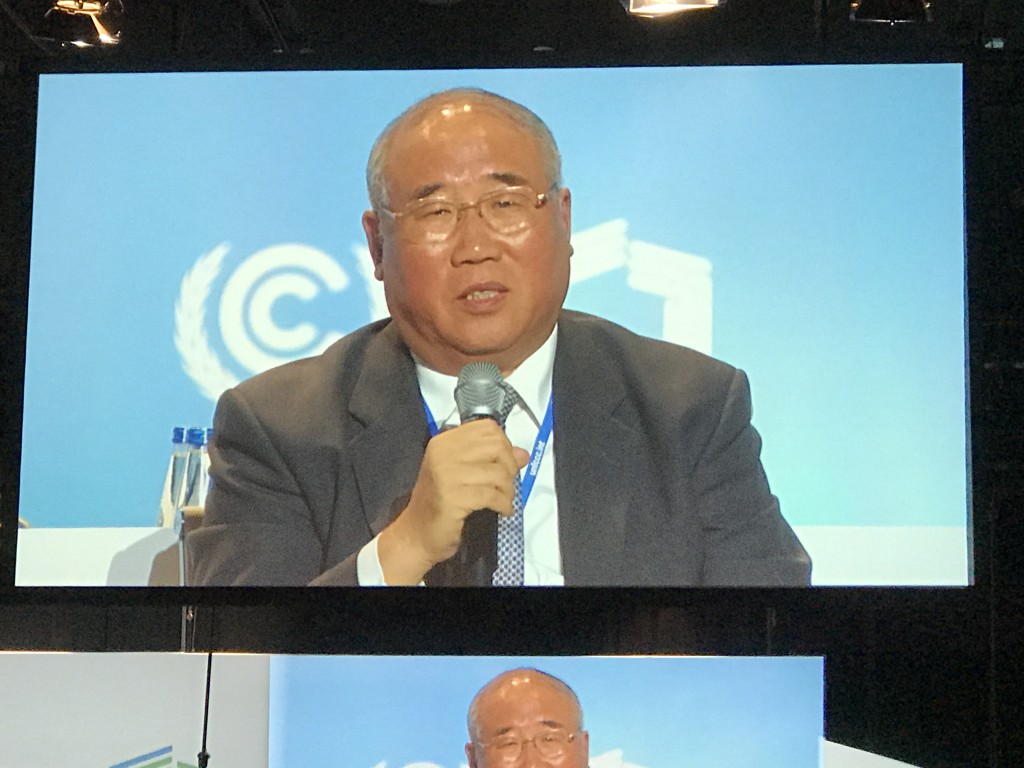
China’s special representative also stressed China’s efforts and successes. Of China’s (also modest) 2020 objectives, two have been achieved three years early: 1) lower carbon intensity by 46% (the objective was 40-45%), and 2) forest coverage, which is now “much higher than expected.” Some of the translation was hard to follow, but China also mentioned electric vehicles (1.6 million), a carbon market with a trading volume of 33 billion tons—the largest carbon market in the world—as well as south-south cooperation in 29 developing countries (support in areas of early warning, reduction and prevention, efficiency, renewables).
Australia stressed its success in “incentivizing demand for renewables.” Melissa Price mentioned a “reverse auction mechanism” which “contracted 100 million tons of abatement since 2015.” The government will provide 1 billion in grants over five years, including some focused on Pacific nations; they share measurement, reporting and verification experience, such as helping in 2009 with Indonesia’s forest monitoring program, which they then expect Indonesia to share with others. There’s a reef initiative; Australian farmers are increasing their productivity. Their “Clean Energy Finance Organization” is the world’s largest green bank: they contributed 10 billion to organizations matched by double that amount of private investment. They doubled their investment levels from 2015 to 2020. Renewables will grow in mix by 23% to consumer by 2020. What can I say? It all sounded kind of weak to me.
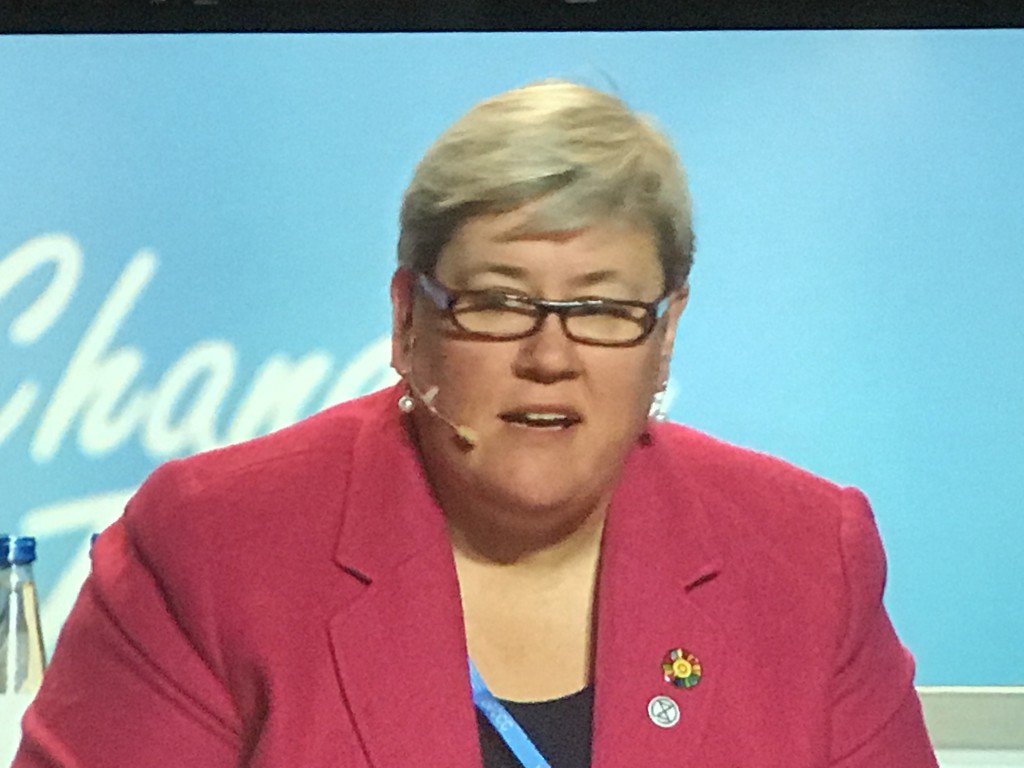 The moderator Rachel Fyke said, “It’s clear that some things are working and working well—we’re still not where we need to be—where would you like to see the focus to be moving forward?”
The moderator Rachel Fyke said, “It’s clear that some things are working and working well—we’re still not where we need to be—where would you like to see the focus to be moving forward?”
The EU stressed structures and governance. Grenada said they needed more financing. China said we need to change our lifestyles (and no one picked up on that). Fyke challenged Poland and Australia more directly. “A signal must go out from this room.” Poland and Australia pretty much doubled down on what they were doing.
Then Fyke took questions from the floor.
India wanted to know whether the actions that had been taken were adequate (answer: obviously not). He mentioned significant gaps—up to 40%–noted in IPCC, but he also complained that the IPCC report didn’t do justice to the urgency of the issues: it didn’t call out those failing to act.
He proposed that any emission gap from this pre-2020 stocktake be carried over to post-2020 (instead of letting Parties get away with failing to live up to their NDCs). Significant gaps in support (that 100 billion per year has not yet been achieved) should also be carried over. [I can’t imagine developed nations agreeing to this.]
Ecuador ramped up the pressure. She spoke fast and furiously: “None of the clear mandates have been met. We are moving away from the possibility of meeting targets, putting at risk our trust in process. The IPCC report clearly underscored the importance of efforts on poverty eradication—ministers recognized main countries responsible for situation have not met responsibilities: they are falling behind. This is the climate debt we have to the planet and to current and future generations. We need financing, tech transfer, capacity building. Kyoto was not met, Cancun not met: we hope the secretary’s report on pre-2020 will be updated regularly and used to determine opportunities for support.”
The Maldives got the last word on the panel: Concerns about progress led us to call for stocktake last year: we knew we were falling short—Small Island Developing Nations are uniquely vulnerable. We were startled by findings of the IPCC: without dramatic transformation, we could hit 1.5 by 2030. This shines a new light on the importance of pre 2020 action.
